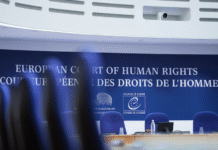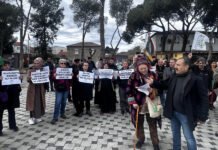Turkish government issued detention warrants for 346 military officers, including many on their active duties, on Friday across Turkey as part of its massive post-coup witch hunt campaign targeting alleged members of the Gülen movement.
The Chief Prosecutor’s office in İstanbul issued detention warrants on Friday for 271 military officers, including 122 on-duty, as part of a probe into alleged members of the Gülen movement. Police launched operations in 47 provinces across Turkey to detain them.
It was reported that 120 of them were military cadets before the controversial military coup attempt on July 15, 2016. The sought military officers also include a lieutenant general and 29 military officers who were dismissed from the military by government decrees under the state of emergency declared in the aftermath of the coup bid.
Meanwhile, the Chief Prosecutor’s office in İzmir, in western Turkey, issued detention warrants for 75 military officers, including 59 on-duty, on Friday over their alleged links to the movement. At least 37 of them have already been detained in İzmir province.
Detention warrants have been issued in July for a total of 462 active duty and former military members over alleged the Gülen movement links. Turkish authorities in June had ordered the detention of at least 312 military personnel in operations targeting suspected supporters of the movement.
The ruling AKP government dismissed 24,977 military members including 150 generals, 4,630 officers, 2,167 noncommissioned officers, 1,210 specialized sergeants, 411 civil servants and workers, and 16,409 cadets following the failed coup over alleged links to the Gülen movement.
Defense Minister Nurettin Canikli on April 18, 2018 said the government had identified 3,000 active duty military officers suspected of links to the Gülen movement and that they would be dismissed with a government decree in the coming days.
Official statements claim that 8,651 military members including cadets and privates took part in the failed coup.
Director General of Public Security Selami Altınok on Dec. 12, 2017 said 22,987 police officers had been dismissed over alleged links to the Gülen movement.
“If it was a coup perpetrated by the Gülen movement and 25,000 military personnel and 22,987 police officers were dismissed for their connections to the movement, why did only 8,651 military members including cadets and privates participate in the coup?” is a question being asked by critics.
The government has been at the center of criticism for turning the Turkish armed forces into a political Islamist military in line with the wishes of President Erdoğan.
A military officer candidate was reportedly asked questions about the Quran and the anti-government Gezi protests of 2013 during an interview in October 2017.
In June, an imam-hatip, or religious high school, in İzmir province promised its graduates preference in enrollment at military and police academies.
Some find the Turkish government’s efforts to Islamicize the Turkish army alarming and warn that NATO risks having a member army filled with extremists.
In February of last year Henri Barkey, director of the Middle East Program at the Washington-based Wilson Center, said that many generals purged by the Turkish government are pro-NATO and pro-American, saying this could create a shift in Turkey-NATO relations.
The head of Germany’s Federal Intelligence Service (BND), Bruno Kahl, last year said Turkey could not convince them that US-based Turkish-Islamic scholar Gülen was behind the failed coup in July.
Similarly, Devin Nunes, chairman of United States House Permanent Select Committee on Intelligence, said in an interview with Fox News in March 2017 that he had not seen any evidence showing Gülen’s involvement in the putsch in Turkey.
In addition, a report prepared by the EU Intelligence Analysis Centre (IntCen) revealed that the coup attempt was staged by a range of Erdoğan’s opponents due to fears of an impending purge.
Turkey survived a controversial military coup attempt on July 15, 2016 that killed 249 people. Immediately after the putsch, the Justice and Development Party (AKP) government along with President Recep Tayyip Erdoğan pinned the blame on the Gülen movement.
Fethullah Gülen, who inspired the movement, strongly denied having any role in the failed coup and called for an international investigation into it, but President Erdoğan — calling the coup attempt “a gift from God” — and the government initiated a widespread purge aimed at cleansing sympathizers of the movement from within state institutions, dehumanizing its popular figures and putting them in custody.
Turkey has suspended or dismissed more than 150,000 judges, teachers, police and civil servants since July 15. On December 13, 2017 the Justice Ministry announced that 169,013 people have been the subject of legal proceedings on coup charges since the failed coup.
Turkish Interior Minister Süleyman Soylu announced on April 18, 2018 that the Turkish government had jailed 77,081 people between July 15, 2016 and April 11, 2018 over alleged links to the Gülen movement.















